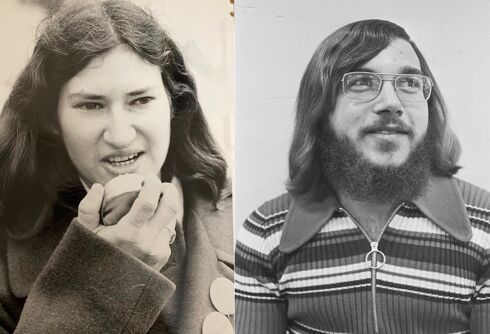Langston Hughes, Poet
b. February 1, 1902
d. May 22, 1967
“What happens to a dream deferred? Does it dry up like a raisin in the sun? Or does it fester like a sore—and then run?”

A celebrated poet and novelist, Langston Hughes is one of the most significant voices to emerge from the Harlem Renaissance. A major contributor to American literature, his legacy includes 25 published works.
Never Miss a Beat
Subscribe to our newsletter to stay ahead of the latest LGBTQ+ political news and insights.
Hughes was born in Joplin, Missouri. After his parents divorced, he moved to Lawrence, Kansas, where his grandmother raised him until her death. By the time he was 14, he had lived in nine cities with various families.
Hughes showed impressive literary aptitude. In eighth grade, he began writing poetry, short stories and plays and was elected “class poet.” His breakthrough poem, “The Negro Speaks of Rivers,” was published shortly after he graduated from high school.
In 1921, at the urging of his father, Hughes enrolled at Colombia University to study engineering. He left after two semesters due to racial discrimination.
Over the next few years, Hughes worked odd jobs while pursuing a writing career. He traveled to Africa and Europe on the crew of a shipping vessel before moving to Washington, D.C. While employed as a busboy, Hughes met poet Vachel Lindsay, who helped promote his work.
In 1926, Hughes’s first book of poetry, “The Weary Blues,” was published. Well received by literary critics, it earned him a reputation as the country’s leading black poet. A year later, his second book of poetry, “Fine Clothes to the Jews,” was published. Heavily influenced by blues and jazz, his work portrayed life in black America and addressed racism and oppression.
In 1929, Hughes graduated from Lincoln University. He traveled to Haiti and to the Soviet Union, where he studied communist theory. In 1934, Hughes became head of the League for Negro Rights, the main African-American branch of the Communist Party. A victim of McCarthyism, he was subpoenaed to appear before the Senate Permanent Sub-Committee on Investigations in 1953.
Like most artists of his time, Hughes was not open about his sexuality. Literary scholars point to “Montage of a Dream Deferred,” “Desire,” “Young Sailor” and “Tell Me” as gay-themed works.
Hughes died at age 65 from prostate cancer. His ashes are memorialized in Harlem at the Schomburg Center for Research in Black Culture.














